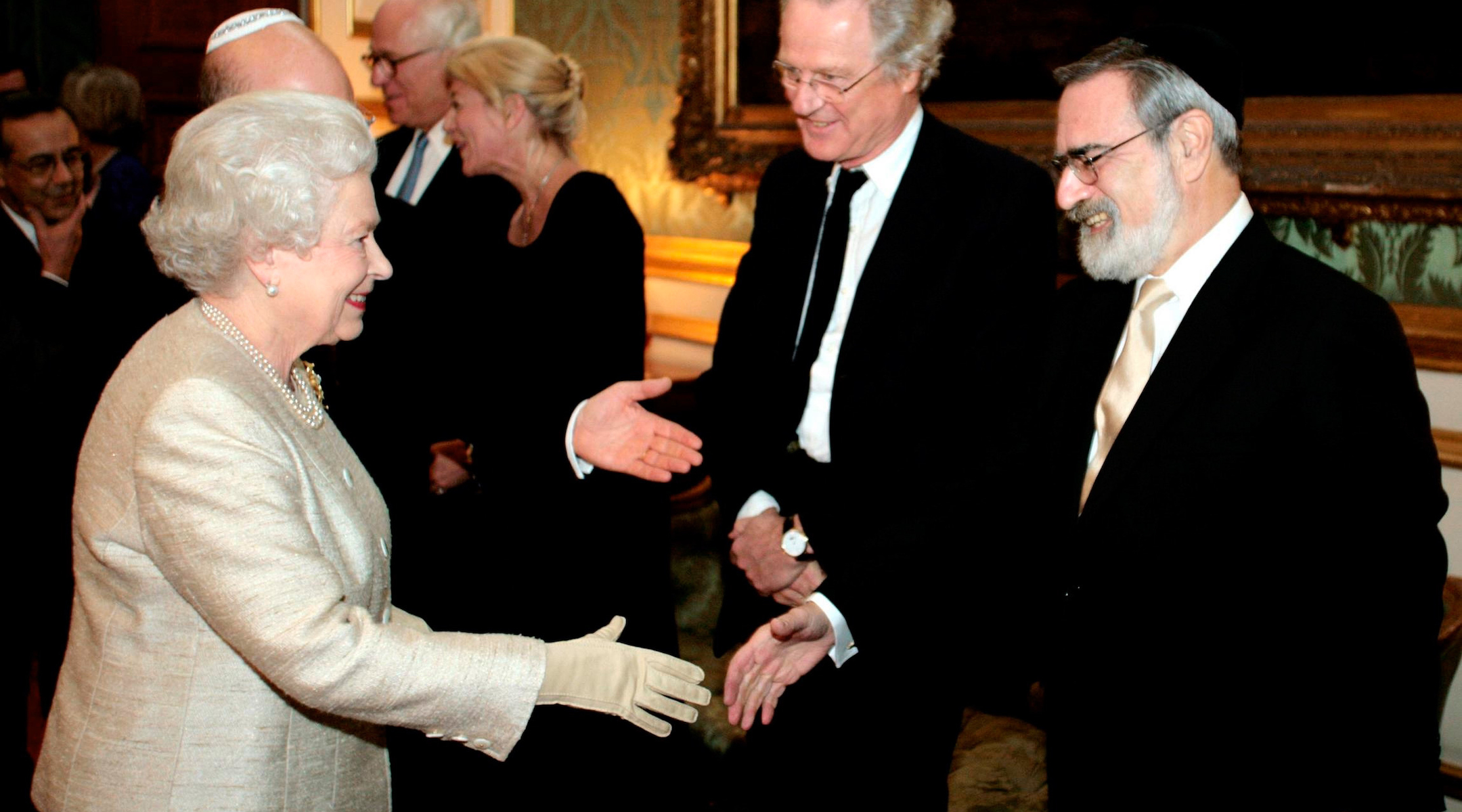The late Rabbi Jonathan Sacks’ unpublished works to be digitized
Sefaria, the Jewish digital library, is adding to its online archive of the former UK chief rabbi’s teachings

Britain’s Queen Elizabeth II meets Chief Rabbi Sir Jonathan Sacks as she attends a reception at St James’s Palace in London to mark the 350th anniversary of the re-establishment of the Jewish community in Britain. Photo by Andrew Parsons/WPA ROTA/PA
Unpublished writings and out-of-print work by the late biblical scholar and former chief rabbi of the United Kingdom, Jonathan Sacks, will soon be available online.
The Jewish digital library Sefaria is digitizing the work in collaboration with the Israeli publisher Koren Jerusalem and The Rabbi Sacks Legacy, which already operates a searchable database of his work and will add pedagogical resources based on his teachings.
Koren Jerusalem plans to issue three dozen volumes of Sacks’ previously unpublished work in English, translate other works into Hebrew, and reprint earlier works that have been unavailable for years.
The first release of the newly available work will go online in 2024.
Ragman’s son
Sacks, who died in 2020, served as chief rabbi of Britain’s United Hebrew Congregations of the Commonwealth from 1991 to 2013. He was knighted by Queen Elizabeth in 2005 and was made a Life Peer, with a seat in the House of Lords, in 2009.
Sacks was born in London to a mother who worked in her family’s wine business and a Polish immigrant father who sold textiles, or as Sacks put it, shmattas (Yiddish for rags).
He grew up to be one of the world’s most influential Orthodox Jewish thinkers. His commentaries and teachings on weekly Torah portions, along with daily and holiday prayers, are used around the world.
“Rabbi Sacks was not only a brilliant scholar but also a beloved leader who bridged the wisdom of the past with the demands of the present,” said Joanna Benarroch, global head of The Rabbi Sacks Legacy. “This collaboration pays homage to his enduring influence on Jewish learning.”
He wrote more than 40 books, including Morality: Restoring the Common Good in Divided Times, which was a top 10 Sunday Times bestseller and the National Jewish Book Council’s 2020 Book of the Year.
Orthodoxy
But while he became a popular spokesperson for some aspects of Jewish thought and practice, his Orthodox approach was not universally appreciated. He wouldn’t participate in radio broadcasts with Reform rabbis, and he took conservative positions on women’s issues. He refused, for example, to accept women as lay leaders in synagogues and held that women could not remarry without a get from their husbands.
Sacks served as the rabbi at two synagogues and taught at many institutions including Yeshiva University, New York University, King’s College London, University of Essex, Hebrew University of Jerusalem, Manchester University, Jews’ College, Newcastle University, and the universities of Oxford, Edinburgh, and St. Andrews. He won numerous awards for his work, and his 2017 TED Conference talk has been viewed almost 2 million times.
He had a way of expressing profound thoughts elegantly and simply.
“I believe faith is part of what makes us human,” he said. “It is a basic attitude of trust that always goes beyond the available evidence but without which we would do nothing great. Without faith in one another we could not risk the vulnerability of love. Without faith in the future we would not choose to have a child. Without faith in the intelligibility of the universe we would not do science. Without faith in our fellow citizens we would not have a free society.”
A message from our CEO & publisher Rachel Fishman Feddersen
I hope you appreciated this article. Before you go, I’d like to ask you to please support the Forward’s award-winning, nonprofit journalism during this critical time.
We’ve set a goal to raise $260,000 by December 31. That’s an ambitious goal, but one that will give us the resources we need to invest in the high quality news, opinion, analysis and cultural coverage that isn’t available anywhere else.
If you feel inspired to make an impact, now is the time to give something back. Join us as a member at your most generous level.
— Rachel Fishman Feddersen, Publisher and CEO